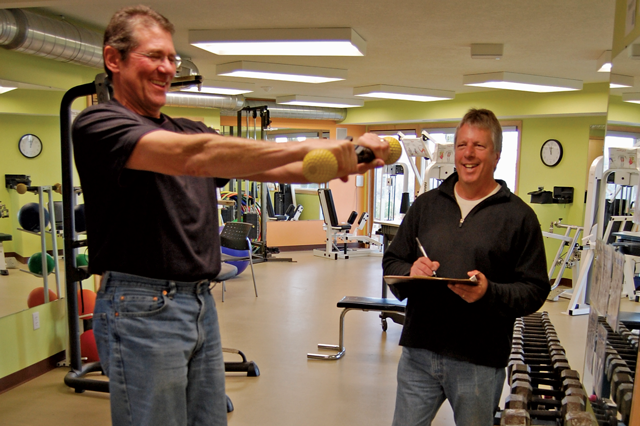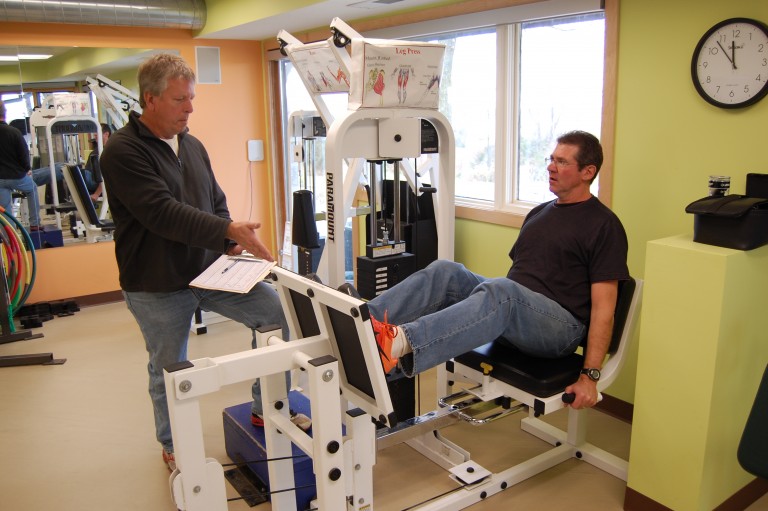Physical Health and Proper Nutrition Are Key Components in Successful Recovery from Substance Abuse

After years of neglecting their health, many of Vinland’s clients arrive for treatment with their bodies in poor shape. A lifestyle of abusing harmful chemicals, involvement in accidents, and poor health choices result in a variety of health problems for many clients. Chronic pain, poor posture caused by bad health and low self-esteem, and high- or low-body weight are common issues facing Vinland’s clients.
The Therapeutic Exercise Program is a cornerstone of Vinland’s approach to substance abuse treatment. The purpose of the program is to address an individual’s poor nutrition and exercise choices, and to teach them effective and appropriate ways to care for their bodies. The main focus of the program is to help clients better perform activities of daily living. While improving a client’s physical appearance is not the main focus of the program, with exercise and postural training, physical appearance does improve.
“Physical health is important,” said Jeff Willert, Vinland’s Fitness & Wellness Manager. “If you feel better physically, then you feel better mentally. People are less likely to go back to using drugs and alcohol if they are taking care of themselves physically.”
Focus on Strengths
Each client receives a therapeutic exercise assessment at the beginning of treatment. The assessment determines a client’s current physical fitness level, providing a baseline for providing treatment and measuring improvements. The assessment measures upper body strength, lower body strength, balance, hand and eye coordination/brain speed, pain levels, body fat percentage, and lumbar extension and flexion to check disc pathology.

“We focus on a client’s strengths, their positives. They are tired of hearing about their negatives. People have more strengths than they realize. ”
Many clients are hard on themselves when they first enter treatment, but Jeff encourages clients not to judge their abilities in the therapeutic exercise center for the first few days.
“We take someone who is broken and we focus on their positives, and then they start to like the way they look and feel.”
Exercise and Mental Health
Exercise is well-known to reduce symptoms of depression and anxiety. Research also shows that exercise can increase the amount of new nerve connections in the brain, which helps the brain heal from the negative effects of drug and alcohol abuse. As the body and mind return to a more natural state, many people in recovery find exercise also helps restore a normal sleep schedule.
“The therapeutic exercise program helps clients find meaning and purpose in their lives,” Jeff said. “It gives them confidence. Boredom is a threat to sobriety, and exercise gives people something to do. They are also more likely to volunteer or find work.”
Nutrition and Recovery
As part of the program, clients learn about proper nutrition. Nutrition is an important component to overall health, impacting a person’s mood, behavior, and mental health. The classes teach the basics of healthy nutrition, how poor nutrition can negatively impact medical conditions, and how to make healthy food choices.
All people who abuse alcohol and/or drugs experience some level of malnutrition. Recovery from substance abuse affects the body in a variety of ways, including metabolism, organ function, and mental well-being. Proper nutrition aides the healing process by supplying the body with the vitamins and minerals needed for energy and to build and maintain healthy organs.
“We are providing clients with the basic information they need to make healthy food choices when they leave Vinland,” Jeff said.
